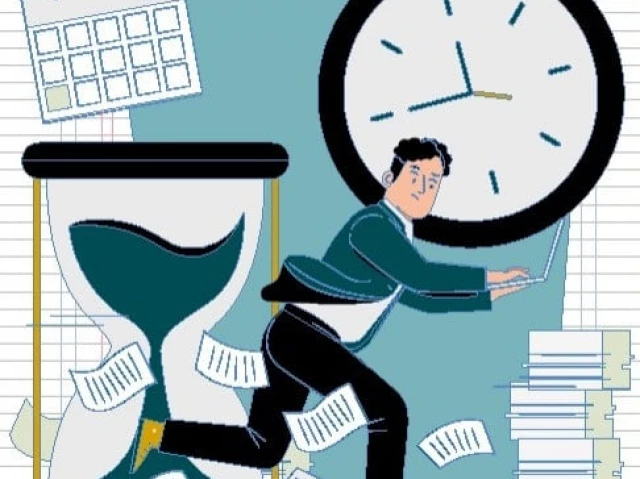Against the ticking clock
The case for a deliberate life in a tumultuous nation

In a country where speed is synonymous with survival, the very idea of slowing down can sound indulgent. Whether it's the frenzied refresh of X timelines now that it's accessible to us without VPNs slowing it down, the incessant pings of WhatsApp groups, or the honking chaos of urban commutes, life in Pakistan is lived on the fast track.
We rush to catch the 9:01 bus, yet delay the most important conversations to "we'll see tomorrow." We are a people of paradoxes: intensely reactive, passionately expressive, and yet deeply nostalgic for stillness.
Let's make one thing clear: this is not a romantic appeal to abandon ambition or retreat from responsibility. We know this because I myself am writing this out of my own sense of urgency to get this across. Nor is it a call to ignore crisis. Rather, it is an argument for reclaiming our time, our attention, and our collective sanity from a culture increasingly dominated by urgency.
The slow living movement, often associated with privileged enclaves in the Global North, has relevance here too, especially in a nation like ours, where political instability, economic precarity, and a digitally accelerated lifestyle collide to breed exhaustion.
The tyranny of time
Multitasking has long been hailed as the holy grail of productivity. But neuroscience tells a different story. Juggling multiple tasks doesn't boost efficiency, it chips away at it. When the brain is forced to rapidly switch contexts, cognitive performance tanks, attention spans shrink, memory fades, and naturally, stress builds.
Add burnout to this mix, and the picture gets bleaker. No longer just a corporate buzzword, burnout has become a cultural crisis. The World Health Organisation classifies it as an "occupational phenomenon" caused by chronic workplace stress.
According to Deloitte's 2023 Global Survey, over 52 per cent of Gen Zs and nearly half of millennials worldwide report feeling burnt out. In Pakistan, where precarious employment, overwork, and minimal mental health infrastructure are the norm, that number likely skews even higher. We are, collectively, exhausted.
But even when we're off the clock, we don't slow down, we just switch gears. We chase micro-pleasures at warp speed. One reel becomes ten. One tweet leads to a thread. Our leisure, too, has been hijacked by the algorithm. And unsurprisingly, anxiety has become the background noise of modern life. According to the WHO, one in seven adolescents (aged 10-19) worldwide experiences a mental disorder, with anxiety and depression driving the surge.
In Pakistan, this digital deluge is impossible to ignore. DataReportal's 2025 Digital Report shows that 66.9 million Pakistanis, over a quarter of the population, are active social media users. On average, they spend nearly 3.5 hours daily on social platforms. And with X recently unbanned, yet another scroll hole has reopened, ready to vacuum up our attention and feed our dopamine cravings.
How to slow down
Speed is woven into Pakistan's cultural fabric. The phrase "jaldi karo" is an ethos. From weddings to WhatsApp replies, everything must happen now, and faster, because delays are met with irritation, queues provoke rebellion, and slowness is mistaken for incompetence.
Our infrastructure reflects this ethos. Karachi's traffic is a daily war we wage with and against acceleration and aggression, internet bundles expire faster than chai cools, the news cycle is relentless, breaking faster than it can be processed. We don't just consume information; we devour it and then we hit refresh.
But speed has costs. It makes us reactive instead of reflective. It incentivises output over quality, performance over well-being. It alienates us from our bodies, our histories, and from one another.
Yet, within our own cultural practices lie the very tools for slowness. Consider the patience of a slow-cooked nihari, simmering for hours to reach perfection. Or the communal rhythm of a dastarkhwan, where meals stretch into stories. Think of truck art, not painted in haste but laboured over in devotion. Think of the afternoon siesta (the venerable "qailula"), a centuries-old practice now swallowed by workaholic hustle culture. Slow living is not alien to Pakistan; it is simply under threat.
Reviving it doesn't require importing trends from Scandinavia or Kyoto. It means re-rooting ourselves in rhythms we already know, but have forgotten. It means asking: what would it mean to cook without checking our phones? To write without toggling tabs? To sit with discomfort instead of tweeting it away?
Returning to ourselves
In a country where trauma is cyclical and crisis endemic, slow living is a form of resistance. To live slowly is to assert that not everything needs to be monetised, optimised, or accelerated. It is to create space for grief, for rest, for joy without apology.
This doesn't mean quitting your job to live on a farm (though more power to you if you do). It could mean enforcing a daily screen timeout. It could be as simple as listening (truly listening) to someone without composing your reply mid-sentence. It means anchoring the day in rituals, however small: boiling chai, walking without headphones, calling your nani.
There is much to learn from Japan's "slow life" ethos or Italy's "dolce far niente." But their power lies not in replication, but adaptation. Pakistan's version of slow living must be rooted in its own soil, in craft traditions that refuse mass production, in mango seasons that demand waiting.
We must also be cautious. To preach slowness amid poverty or violence can feel tone-deaf. Not everyone has the privilege to pause. But even amidst precarity, there are ways to resist the tyranny of speed. Slowness can be free. It can be radical. And it can begin with five deep breaths before logging on.
As Pakistan grapples with economic shocks, climate crises, and digital overload, slowing down might seem like a luxury. But perhaps it is a necessity. The future is uncertain, but how we move toward it is a choice.
So maybe it's time to make daal from scratch. Maybe it's time to watch the sun set without photographing it. Maybe it's time to do one thing at a time. Slowly. Deliberately. Together. Not because the world is burning, but because it's worth savouring.



















COMMENTS
Comments are moderated and generally will be posted if they are on-topic and not abusive.
For more information, please see our Comments FAQ